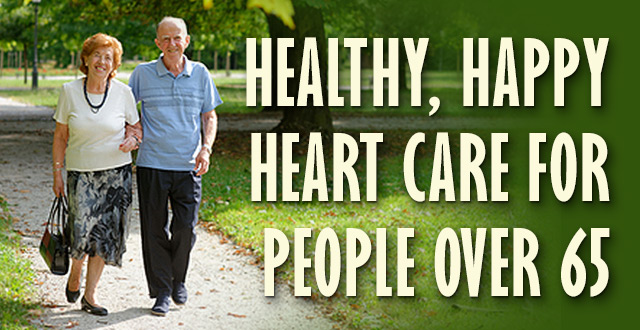Many people over the age of 65 believe the risks of heart disease become inevitable with age. Although heart disease is a threat to the health of seniors, with up to 84 percent of those over 65 diagnosed with it, there are plenty of ways to keep your heart healthy and happy.
Heart disease is not a proven, inevitable part of getting older. Rather, it often stems from poor lifestyle habits and decisions. The good news is, even at the age of 65 and older, your body is still able to repair cells and reduce the risk of heart disease. All it takes is a little extra effort upon yourself. Here are five things you can do every day to keep your heart working effectively enabling it to be the best it can be for you and your well-being.
1. Eat Healthy Fats
Fats are a vital part to the human diet. Healthy fats include saturated, polyunsaturated and unsaturated fats. Trans fat, a popular additive to many packaged foods such as margarine, is one fat you want to avoid as best as possible. This fat is shown to increase your risk of developing heart disease or stroke because it clogs arteries, increases bad cholesterol levels and lowers good cholesterol levels.
Alive 65 Tip: Read the labels of your food. Trans fat often is listed as ‘partially hydrogenated oils’
2. Practice Good Dental Hygiene
The health of your teeth and gums can indicate how healthy you overall body is, including your heart. People who have gum disease often are at risk for heart disease, and although the reason for this is still not fully understood, it is believed to do with certain bacteria in the mouth. These bacteria can move into the bloodstream and raise the C-reactive protein, which leads to inflammation in the blood vessels. As a result, you can become more at risk for heart disease and stroke.
Alive 65 Tip: Floss your teeth every day before you brush with an all-natural toothpaste
3. Get Adequate Sleep
A study* of 3,000 adults over the age of 45 found that people who sleep less than 6 hours a night are twice as likely to have a stroke or heart attack than those who slept between 6 and 8 hours each night. Sleep is essential to your physical and mental well-being, and sleeping too little could increase anxiety or stress levels as well as blood pressure; thereby raising the risks of developing heart problems.
Alive 65 Tip: If you have trouble sleeping, talk to your doctor about valerian root, an all-natural sleeping aid
*https://sleepfoundation.org/excessivesleepiness/content/how-sleep-deprivation-affects-your-heart
4. Avoid Sitting in One Place for Too Long
Ongoing research suggests sitting in one place for too long, no matter how active you may be, could significantly increase your risk of cardiovascular problems including deep vein thrombosis (a blood clot). Make the effort to get up and move throughout the day. Park further away from the shop doors, go for morning or evening walks and take 15 minute ‘movement’ breaks every hour.
Alive 65 Tip: In addition to moving, make sure you’re drinking plenty of pure water to keep your blood optimally circulating
5. Try Heart-focused Breathing Techniques
We all breathe, but many of us only use about 25% of our lung capacity with each inhalation. This means you’re missing out on up to 75% more oxygen during your intake. Oxygen not only keeps you alive, but rather it enables cellular growth; and when there is a lack of it, hypoxia can occur. Hypoxia has been linked with several diseases including cancer, tumor growth, heart disease, stroke, and various other neurodegenerative diseases. Ideally, you should be taking 6 large breaths every minute. If you’re not doing so, start breathing more now!
Alive 65 Tip: Try this simple breathing exercise to improve your oxygen flow and decrease your risk of heart disease – Close your eyes and take a deep breath from the navel area. As you do so, imagine your heart becoming enriched in oxygen. Once you’ve breathed in as much air as possible, hold for a second or two and then release your breath on an exhalation. Try this breathing exercise 5 or 6 times every day. If your breathing becomes forced or uncomfortable, try reducing the inhalation or hold time. You may need a few days to get used to breathing like this before establishing a natural rhythm.
The body and mind is powerful and has an enormous ability to protect your heart; however, it is up to you to start the healing and restorative process. By eating healthier, practicing better hygiene, sleeping more, moving around and increasing your oxygen intake, your heart will feel happier and healthier. Are you ready to try these techniques out for yourself?

